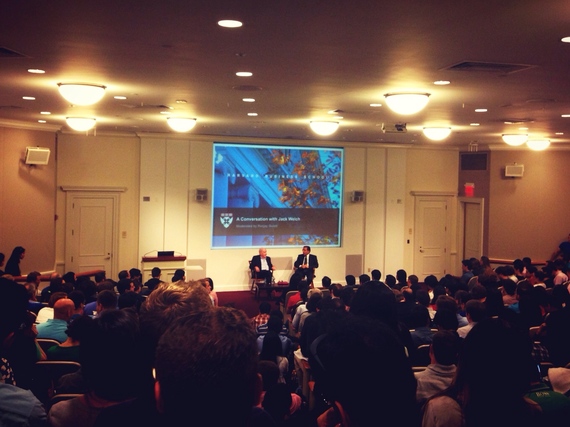It was almost four o'clock. The clock was ticking. I was running to see Jack Welch, former chairman and CEO of General Electric. When I walked through Spangler Hall, I ran into a friend. She wished me good luck. The auditorium was already packed beyond capacity when she left earlier.
And she was right. When I arrived, I barely made it through the door. All seats taken, all possible aisles crammed with students. I could feel how people in the back were debating whether or not to stay. Understandably, from the back the conversation wasn't entirely intelligible.
Though when Jack talked, everyone stayed quiet and listened. When they didn't listen, they laughed. With every passing minute, as students decided to leave, I got closer to Jack and eventually got a seat. In conversation with HBS professor Ranjay Gulati, Jack shared many insights.
It was through stories and anecdotes that Jack revealed his authentic character and originality. He spoke his mind. And honesty breeds respect. I wanted to share his originality and insights in three ways.
1. Honesty
"Love them on the way out the same way as you do on the way in," Jack repeatedly said. He adamantly insisted on giving employees no surprises. He stressed that an open communication between employee and employer. That creates trust. Make the severance attractive. Be generous. Give them a continuing project. Keeep their bills for some time. But if they need to depart tell them.
You, as the executive of the company, have the responsibility. You were the one who hired him or her. "A bad firing is a sin," Jack cautioned. Have everything on the table. And if you do it that way there are no conscious problems.
2. Teamplay
"It is not a communistic event," Jack said referring to business. Everyone laughed. He said that business is a game. The team with the best players win. The main job of the executive is to find the right team and the right players. Teamplay is about assembling a strong team.
He suggested further to hire people you like, those you actually get along with. "I never hired anybody that I did not like," he said. "You have got to be real," he insisted. Look for people with the same sensibilities. He invoked Jeff Bezos who is quoted as saying that he would "rather interview 50 people and not hire anyone than hire the wrong person."
"Energize and be generous in spirit and wallet," Jack said. "You will win in the reflected glory of others," he added. Give credit to others. At the end of the day, business is a very human engagement. Getting capital is not the hardest part. It is getting the right people.
3. Values
"You have to search for the truth," he remarked. Search for the truth constantly. That is a big part of business, he said, getting to the truth. He jokingly said that accounting is an art, not a science.
"Differentiation is deep in my blood," Jack noted. "You should never be victims," he added. Ask yourself where you are going and why you are going there. Put yourself on the line, he suggested. Believe in something. When you say that you will do something do it. Take risks. Gut is nothing more than pattern recognition, which "improves over time as you get older."
Authenticity is key. "You cannot be someone else. It will catch up with you. It will bite you," he argued. Ask yourself whether you love what you are doing. Does it turn you on? Do you see your job as a vehicle of growth? Do I like to hang out with these people? Those are questions that matter.
In the end the ideas that Jack Welch shared are too big to fit into one essay. I focused on three insights. Be honest and deliver feedback. Build a strong team. And maintain your values. Really focus on finding the right people. Little else matters if you don't have the right people.
This piece was originally published as an op-ed at The Harbus, the student newspaper of the Harvard Business School.

